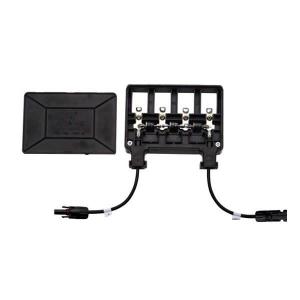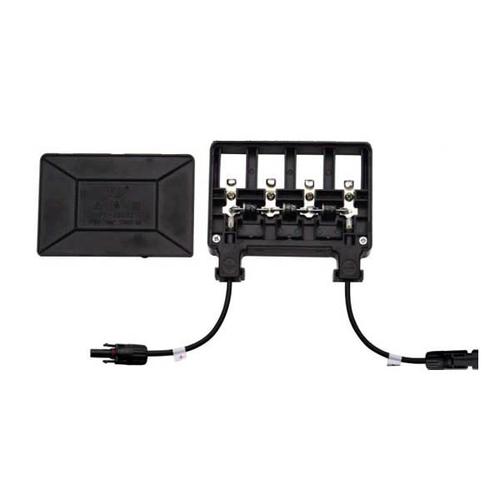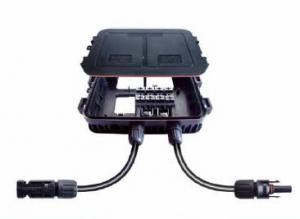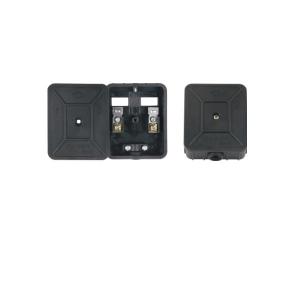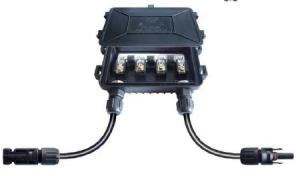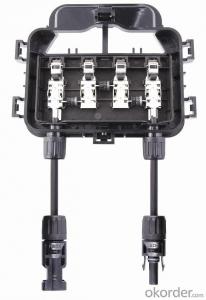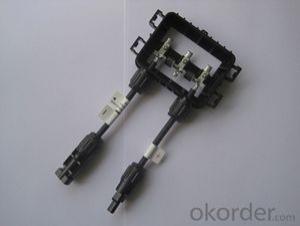Solar Junction box PV-JB002 ST01
- Loading Port:
- China Main Port
- Payment Terms:
- TT OR LC
- Min Order Qty:
- -
- Supply Capability:
- 10000 set/month
OKorder Service Pledge
OKorder Financial Service
You Might Also Like
Solar Junction box ,Due to highly robustness,UV-resistance,the touch protection a high grade connection is guaranteed for many
Solar Junction box ,Due to highly robustness,UV-resistance,the touch protection a high grade connection is guaranteed for many years
Rated voltage 1000 V
Rated current 16A
Contact resistance ≤5mΩ
Dia of pin or socket 3mm /4mm
Protection degree(mated,junction box closed/unmated) IP65/IP2X
Operating temperature -40 C to +85C
Insulation material PPO
Contact material Copper,silver plated
The junction box's inner shoulder be filled with glue under working
- Q: What maintenance is required for a solar energy system?
- Regular maintenance is required for a solar energy system to ensure optimal performance. This includes cleaning the solar panels, checking for any debris or shading that could affect their efficiency, inspecting the electrical components for any damage or loose connections, and monitoring the system's performance through regular data analysis. Additionally, it is necessary to maintain and replace the batteries (if present) and conduct routine inspections to identify and address any potential issues.
- Q: How do I maintain and clean my solar energy system?
- To ensure the proper maintenance and cleanliness of your solar energy system, it is crucial to adhere to several important steps: 1. Conduct Regular Inspections: It is important to regularly inspect your solar panels to ensure they remain in optimal condition. Look out for any indications of damage, such as cracks or loose connections. Additionally, check for the accumulation of debris or leaves on the panels. 2. Periodic Cleaning: Cleaning your solar panels on a regular basis is necessary to maintain their efficiency. Begin by removing any loose debris, including leaves or dirt, using a soft brush or a leaf blower. Next, gently scrub the panels with a mixture of mild soap and water, using a non-abrasive sponge or cloth. Avoid the use of harsh chemicals or abrasive materials that may harm the panels. 3. Prioritize Safety: Always prioritize safety when engaging in solar panel cleaning. Before commencing any maintenance work, ensure that you turn off the system and disconnect it from the electrical grid. If your solar panels are installed on the roof, utilize appropriate safety equipment, such as a harness or ladder, to prevent accidents. 4. Seek Professional Assistance: It is advisable to schedule professional maintenance at least once annually. Professional technicians possess the necessary expertise and tools to identify potential issues, conduct comprehensive inspections, and perform any required repairs. This ensures that your solar energy system operates optimally. 5. Regularly Monitor Performance: It is essential to regularly monitor the performance of your solar energy system. Many solar inverters come equipped with monitoring systems that enable you to track energy production. This enables you to promptly address any decrease in efficiency. 6. Address Shading: Trim any trees or shrubs that may cast shade on your solar panels on a regular basis. Shading can significantly diminish the efficiency of your system, so it is crucial to ensure that your panels receive maximum sunlight. By adhering to these maintenance and cleaning practices, you can ensure that your solar energy system remains in optimal condition, thereby maximizing its efficiency and lifespan.
- Q: Can solar energy systems be used in powering schools or educational institutions?
- Yes, solar energy systems can be used to power schools or educational institutions. Solar panels can be installed on rooftops or open areas to harness sunlight and convert it into electricity. This renewable energy source can help reduce electricity costs, promote sustainability, and provide a valuable educational opportunity for students to learn about clean energy. Additionally, solar energy systems can also serve as backup power during emergencies or power outages, ensuring uninterrupted learning and safety in educational institutions.
- Q: Can solar energy systems be used for powering agricultural irrigation systems?
- Yes, solar energy systems can be used effectively to power agricultural irrigation systems. Solar-powered water pumps are commonly used in agricultural settings to pump water from wells, rivers, or other sources for irrigation purposes. This renewable energy source helps farmers reduce their reliance on fossil fuels and lower their operational costs while ensuring a sustainable and reliable source of power for irrigation.
- Q: How do solar energy systems impact job creation?
- Solar energy systems have a significant positive impact on job creation. The installation and maintenance of solar panels require skilled workers, leading to the creation of employment opportunities in the renewable energy sector. Additionally, the growth of the solar industry stimulates job creation in related fields such as manufacturing, research, and development. The shift towards solar energy not only contributes to a cleaner environment but also fosters economic growth by generating jobs at various stages of the solar energy supply chain.
- Q: How does the size of a solar energy system affect its output?
- The size of a solar energy system directly affects its output. Generally, the larger the solar energy system, the more electricity it can generate. The output of a solar energy system is measured in kilowatt-hours (kWh) and is determined by the capacity of the system, which is usually expressed in kilowatts (kW). A larger solar energy system with a higher capacity can generate more electricity because it has a greater number of solar panels. Solar panels are the primary components of a solar energy system that convert sunlight into electricity. Each solar panel consists of multiple solar cells, which absorb sunlight and produce direct current (DC) electricity. When multiple solar panels are connected together in a solar energy system, their combined capacity increases. This means that more solar cells are working together to convert sunlight into electricity, resulting in a higher output. A larger solar energy system can produce more electricity, especially during peak sunlight hours, when there is ample sunlight available for conversion. Moreover, a larger solar energy system may also have additional components, such as inverters and batteries, which can further enhance its output. Inverters convert the DC electricity produced by the solar panels into alternating current (AC) electricity that can be used in homes or businesses. Batteries store excess electricity generated by the system for later use, allowing for a more consistent output even when sunlight is not available. However, it is important to note that the size of a solar energy system should be properly matched to the energy needs of the user. Oversizing a solar energy system may result in excess electricity production, which might go to waste if it cannot be efficiently utilized or stored. On the other hand, an undersized system may not generate enough electricity to meet the user's needs. In conclusion, the size of a solar energy system directly affects its output. A larger system with a higher capacity can generate more electricity due to a greater number of solar panels and components. However, it is crucial to find the right balance between system size and energy needs to ensure optimal efficiency and utilization of the solar energy system.
- Q: Can solar energy systems be used for street lighting?
- Yes, solar energy systems can be used for street lighting. Solar-powered street lights are becoming increasingly popular as they offer a sustainable and cost-effective solution for outdoor lighting. These systems consist of solar panels that capture sunlight during the day and convert it into electricity, which is then stored in batteries. This stored energy is used to power the street lights during the night. Solar-powered street lights are not only environmentally friendly but also eliminate the need for extensive wiring and electricity consumption. They can be easily installed in remote locations where grid power is not available, making them a viable option for street lighting in both urban and rural areas. Additionally, solar-powered street lights offer the advantage of being independent from the main power grid, ensuring uninterrupted lighting even during power outages.
- Q: Can solar energy systems be used in areas with high levels of air humidity?
- Yes, solar energy systems can be used in areas with high levels of air humidity. While high humidity can affect the efficiency of some components, such as reducing the effectiveness of solar panels, it does not render solar energy systems completely unusable. In fact, solar energy systems are deployed and successfully function in many high-humidity regions around the world. Additionally, advancements in technology and design have improved the performance of solar panels in humid conditions. For instance, anti-reflective coatings on the panels can help prevent moisture buildup and ensure better performance. Overall, while humidity may slightly impact the efficiency of solar energy systems, it does not prevent their use in areas with high levels of air humidity.
- Q: Can a solar energy system be used in areas with limited sunlight?
- Indeed, the utilization of a solar energy system remains feasible in regions with limited sunlight. Although solar panels are most effective when directly exposed to sunlight, they are still capable of generating power in areas with limited sunlight. Even on cloudy days or during periods of low sunlight, solar panels can still produce electricity, albeit with reduced efficiency. Furthermore, the advancement of solar panel technology enables panels to capture and convert even diffuse sunlight, enabling their functionality in areas with limited direct sunlight. Additionally, solar energy systems can be tailored to incorporate energy storage solutions such as batteries. This enables the storage of excess energy generated during peak sunlight hours for later use during periods of limited sunlight. Consequently, solar energy remains a viable and sustainable solution for various regions worldwide, even those with limited sunlight.
- Q: Can solar energy systems be used in areas with low sunlight?
- Yes, solar energy systems can be used in areas with low sunlight. While it is true that solar panels are most efficient in areas with abundant sunlight, they can still generate electricity even in regions with less sunlight. Solar panels are designed to harness both direct and indirect sunlight, allowing them to produce electricity even on cloudy or overcast days. Additionally, advancements in solar technology have made it possible for solar panels to capture and convert even the smallest amount of sunlight into usable energy. Therefore, while solar energy systems may not be as efficient in areas with low sunlight, they can still be a viable and sustainable source of energy in such regions.
Send your message to us
Solar Junction box PV-JB002 ST01
- Loading Port:
- China Main Port
- Payment Terms:
- TT OR LC
- Min Order Qty:
- -
- Supply Capability:
- 10000 set/month
OKorder Service Pledge
OKorder Financial Service
Similar products
Hot products
Hot Searches
Related keywords
